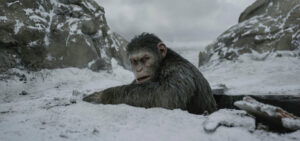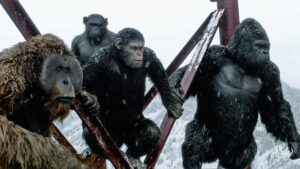Publication Date: 05-06-2024
War for the Planet of the Apes (2017) review
Dir. Matt Reeves
By: Steve Pulaski
Rating: ★★★
As a child, I loathed the phrase “it is what it is.” I thought of it as a cop-out answer or response grown-ups used when they couldn’t think of something to say or didn’t feel like saying a lot. In my line of work, I also think of it as lazy critical analysis that signifies a lack of word choice, or worse, capability to articulate a foreign thought. However, like the hack writer I am, I will fully admit that my reviews of every Planet of the Apes film (the five from the original franchise and the previous installments of the newer trilogy – the Tim Burton remake remains unseen by me at this time) up until this point have kind of been a six-paragraph expansion upon the phrase I’ve yet to use but always, quietly thought about the films – it is what it is.
These are films that have always strained to have more subtext than they were either willing to commit to or capable of adopting. The original films all had a bit of thematic heft but were handicapped in their screenplays or their general direction. The newer trilogy has largely been more impressive, of course technically, but also in terms of scope and emotional arcs. The only lacking point – which was really exemplified in Dawn of the Planet of the Apes – is the human characters, who are all terribly underwritten and cold.
But War for the Planet of the Apes is the best Apes film of the past and present. More than entertaining, it’s extremely well-made, with aesthetics that sometimes leap off the screen and brimful of memorable moments and gorgeous scenery. It conservatively makes us of its nine figure budget, which is still about $60 million less than Dawn, and makes it difficult (but never impossible) to not consider this a ceremonious finale that ties things together quite nicely.
It’s about time too because the science-fiction plot of Planet of the Apes is too rich and substantial not to have a great film associated with its concept. War, once again, picks up on the perils and leadership of Caesar (Andy Serkis), who leads a clan against a military faction known as Alpha-Omega in the wake of Koba’s death, the dissenting and violent ape from Dawn. The plan is for Caesar to move his army of apes across a desert without getting captured by Alpha-Omega, but once Caesar learns that the colonel who runs the organization (Woody Harrelson) has taken his family, the revolutionary inside Caesar explodes and his main goal now is the emancipation of other all the other apes held in captivity.
Caesar enlists in the help of his close friend Rocket (Terry Notary) and the elderly orangutan Maurice (Karin Konoval), but eventually gets more assistance from the likes of an unnamed orphan (Amiah Miller) and a simple, zoo-ape known as “Bad Ape” (Steve Zahn), who provides very mild and amiable comic relief. Together, through dire times, they see the inside of Alpha-Omega, which operates as an Auschwitz-like powerhouse that uses apes for slave labor before most of them succumb to death by starvation and dehydration in the icy tundra.

My main complaint with Dawn of the Planet of the Apes was its lack of characterization in regards to its human characters despite making us spend so much time with them. War for the Planet of the Apes, in contrast, barely lets us see the interworkings of Alpha-Omega. Take that as you will, but I find it to be a surprisingly successful move, let alone a daring one. We can see all the horrors of the organization through heartbreaking sequences devoted to showing the torture of the apes, and we get most of the motivations explained in an admittedly overlong monologue by Woody Harrelson, who is otherwise great in his lean role. We don’t need board-room meetings made up of machomen outlining the intricacies about why they feel it’s just to treat an entire species like objects. It’s an allegory of the current world we live in not-so-subtly pointing its finger at America’s current administration. We get it.
And with that, the emotional plight of Caesar and his maturity become very vivid to us. If you’ve spent meaningful time with him over the course of this trilogy, you’ve seem him grow and develop into an unbelievably wise character, one who manifests himself into something on the same level as a living, breathing human being in this film. Not only a credit to the writing of Mark Bomback and director Matt Reeves, Caesar’s impeccable humanity is large in part thanks to Andy Serkis, who has revolutionized and raised the bar on the emoting powers of motion-capture. His expressions are vibrant and detailed, and his soul is evident through every move, risky or routine, that his character makes.
The entire trilogy has been a testament to the brilliant and often uncredited or shortchanged work of the VFX and graphic designers, a great many of them still battling over credits and money as an industry as a whole. War for the Planet of the Apes is visually stunning moreso than the previous films. Perhaps it’s the pearly white snow or vividly rendered landscapes, but Reeves’ direction has never felt slicker and the contrasting colors of the scenic locations have never felt more vibrant. The fluidity is uncanny and a true showcase of the time we live in where special effects have reached an unbelievable point.
War for the Planet of the Apes is not without its own issues, but most of them are minor in the face of solid pacing, strong acting, and a very successful emotional plight. It’s about fifteen minutes too long, for most of the scenes involving the torture of the apes feels like the same footage being repeated, if not needless. Consider the moment where, yet again, we need to see how brash and unfeeling Harrelson’s Colonel is by him pressing the hollow chamber of a gun to Caesar’s head demanding him to tell the apes to get back to work or suffer the consequences. Moments like this bloat what could’ve been a lean and entirely tense film into a more sporadically suspenseful film that loses gusto.
It was a bit surprising to me when I saw how poorly Transformers: The Last Knight performed at the box office. It’s also a bit of a shock to see how quickly Cars 3 has faded from multiplexes too. Maybe audiences are craving new properties. Maybe Netflix and Amazon Prime have reached a point of unrivaled convenience for consumers. I can only hope in a time that brings so many consumers to unknowingly change the way Hollywood operates by choosing what to spend $100 million or $15 million on that they see War for the Planet of the Apes in efforts to shift the pendulum once again to make blockbuster season smart rather than safe.
My review of Dawn of the Planet of the Apes
My review of Kingdom of the Planet of the Apes
About Steve Pulaski
Steve Pulaski has been reviewing movies since 2009 for a barrage of different outlets. He graduated North Central College in 2018 and currently works as an on-air radio personality. He also hosts a weekly movie podcast called "Sleepless with Steve," dedicated to film and the film industry, on his YouTube channel. In addition to writing, he's a die-hard Chicago Bears fan and has two cats, appropriately named Siskel and Ebert!


